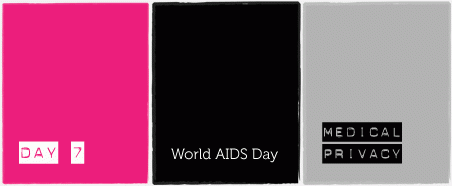
Privacy is critical when it comes to information about our health. It relates to one of the most personal aspects of our bodies and can greatly affect our sense of dignity and personhood. It’s important that we can trust our medical practitioner to keep our health information and medical records confidential, so that we can feel safe to communicate as openly as possible and make informed decisions about our health. Violation of privacy on health information, such as intimate partner violence, sexual assault, abortion, mental health issues and HIV/AIDS, can result in stigma, harm and discrimination.
Women in Tanzania, South Africa and Kenya have said that fear of violence is a major barrier to disclosure of their HIV status, and last year a US woman was stabbed to death by her boyfriend when she shared her positive status. In fact, in a recent literature review by U.S. Positive Women’s Network (PWN), 45% of women reported experiencing emotional, physical or sexual abuse sometime after their disclosure.
Sometimes control over disclosure is taken from women living with HIV. The UNDP reports that 41% of Russians living with HIV had their status disclosed without their consent, and in some places, like Croatia, the laws are too broadly defined to be effective. Several countries in Asia have passed laws but failed to implement them. This contributes to a sense of insecurity about having control over information about our own bodies and well-being and our capacity to make health decisions freely and without fear.
With increasing numbers of hospitals, clinics and doctors’ offices putting medical records online to make them more accessible to providers and patients, the risk of privacy violations for women living with HIV has grown exponentially. Does your country have data privacy laws that relate to medical records? How do these affect women living with HIV? Have there been creative innovations using internet technologies to promote health information about HIV/AIDS in ways that protect privacy and anonymity? For example, this smart phone app was created by the Digital AIDS Community based in Indonesia to provide health information and services anonymously to help address the stigma and misinformation related to HIV in the country.
Share your knowledge. Demand privacy and respect autonomy!
TAKE ACTION
KNOW YOUR RIGHTS
Find out what privacy laws in your country exist to protect the privacy of medical records. Are there any? If not, what do you think might be the implication for yourself or other women who might be seeking information about or living with HIV/AIDS?
If there are laws, but they aren’t being used effectively, what can you do to help women living with HIV find justice and security? Have any citizens successfully sued for their rights?
Search tips:
- Use your country name and keywords such as “medical privacy laws,” “medical record laws,” “data privacy laws,” “HIV disclosure laws” and “HIV confidentiality laws.”
- If your country doesn’t have an up-to-date online directory of laws, try the Global Legal Information Catalogue.
- Browse through documents such as Medical Privacy and Security in Developing Countries and Emergency Situations by Privacy International and UNAIDS resources.
SHARE RESOURCES
Share what you found with others. Post it on your social media, share it on our Facebook page, or write it up as a blog so others can be informed and take action.
How can internet technology help promote health and privacy? If you came across innovative ideas and initiatives, support their work and share them! Send us a tweet @takebackthetech or add them as a comment on this page.
Know your rights! Demand privacy and accountability in medical health. Respect the rights of women living with HIV.
Issue
- Log in to post comments
